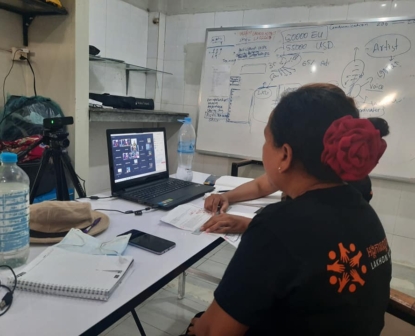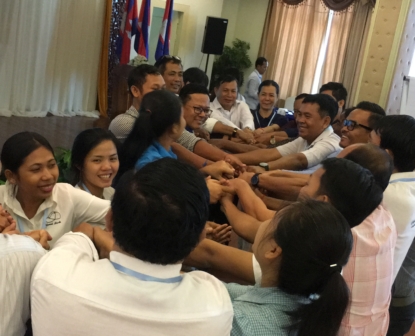Project
Transformative leadership through Art
-
Amount Funded
22,114 EUROProject Duration
01 Feb 2019 - 31 Jan 2020 -
-
Lead organisation
Cambodian Children's Trust
-
Cambodian Children’s Trust (CCT) empowers communities to keep their children safe within families. Cambodian Children’s Trust is expanding its services and reach of the piloted Holistic Family Based Care Model in Battambang Province with the primary focus on the prevention of child-family separation. The Organisation conducts best practice alternative care services such as kinship care, foster care and independent living, as well as empowering families to take their children back from institutional care. CCT mobilises community child protection networks that identify vulnerable families within villages and facilitate tailored interventions. They build support networks around vulnerable families who help to ensure the ongoing safety and well-being of children. They bring vital support services into communities to support and strengthen families, which results to lack of separation from their families to access nutrition, health care and education. CCT is working in close collaboration with the Ministry of Social Affairs, Veterans and Youth Rehabilitation (MoSVY), DoSVY and Residential Care institutions in Battambang Province to safely reintegrate children back to their families and communities.
-
Organisation
Cambodian Children’s Trust (CCT) empowers communities to keep their children safe within families. Cambodian Children’s Trust is expanding its services and reach of the piloted Holistic Family Based Care Model in Battambang Province with the primary focus on the prevention of child-family separation. The Organisation conducts best practice alternative care services such as kinship care, foster care and independent living, as well as empowering families to take their children back from institutional care. CCT mobilises community child protection networks that identify vulnerable families within villages and facilitate tailored interventions. They build support networks around vulnerable families who help to ensure the ongoing safety and well-being of children. They bring vital support services into communities to support and strengthen families, which results to lack of separation from their families to access nutrition, health care and education. CCT is working in close collaboration with the Ministry of Social Affairs, Veterans and Youth Rehabilitation (MoSVY), DoSVY and Residential Care institutions in Battambang Province to safely reintegrate children back to their families and communities.
-
Project
Transformative leadership through Art project is strengthening the understanding of rights and is empowering behavioral change using art performances and discussions that highlight concerns of the elderly, people living with disability, LGBTI and women facing extreme violence. After the success of the previous project under the Voice grant, the second project phase intends to strengthen the performance capacity of 12 women and transform them to become agents of change, influencing behavior change of duty bearers and the community through community forum theatre. The project strengthens the capacity of 12 women on how to create scenarios and manage the show or forum in theatre while engaging local authorities and public service providers including the health and education sector to participate in forum theatres. This gathers attention and ensures responsive support to those whose voices are unheard and left behind. The project targets 3 highly populated villages, especially those living in former slum areas of Battambang province.
-
-
Transformative leadership through Art project is strengthening the understanding of rights and is empowering behavioral change using art performances and discussions that highlight concerns of the elderly, people living with disability, LGBTI and women facing extreme violence. After the success of the previous project under the Voice grant, the second project phase intends to strengthen the performance capacity of 12 women and transform them to become agents of change, influencing behavior change of duty bearers and the community through community forum theatre. The project strengthens the capacity of 12 women on how to create scenarios and manage the show or forum in theatre while engaging local authorities and public service providers including the health and education sector to participate in forum theatres. This gathers attention and ensures responsive support to those whose voices are unheard and left behind. The project targets 3 highly populated villages, especially those living in former slum areas of Battambang province.
-
Catalyst for individual development and community empowerment
“I had never, ever been able to make my husband listen to my ideas. Any time we talked about a problem within the family, and I mentioned anything my husband had done that was not right – drinking, gambling, anything – he would become angry instantly and curse at me. Which made me angry back. Every discussion just turned into an argument. Now, things have changed. If he gets angry, I control myself. I stay calm and say what I need to say in a normal voice, without getting angry. Ever since I started doing that, everything changed. He listens to me, we discuss things, and we make decisions together.” – Ms. Pov Sovann
In its “Transformative Leadership through Art” project, the Cambodia Children’s Trust (CCT) used a combination of theatre skills and agriculture training to amplify the voices of rightsholders experiencing discrimination based on gender, disability, age, sexual orientation, and economic status. Through confidence building and experience sharing, the participants were able to reflect on their life-situations and find opportunities for change that improved their living conditions. They gained awareness of their rights and enhanced confidence, enabling them to communicate better with their families, community members, and local authorities about improving access to their rights.
The “Forum Theatre” activities engaged the women in art. Twelve women from three communes in Battambang Town, attended a series of theatre workshops through which they developed skills in performance, sharing stories, and creating performances based on real-life challenges they had faced. During performances in their villages, the women used Forum Theatre to present their stories showing different protagonists facing different challenges. The audience was then asked to intervene as the action is re-played, coming onto the stage and acting out alternative solutions with different results. Audiences included ordinary villagers, NGO beneficiaries and staff, and local authorities.
Alongside these theatre activities, the women also participated in agriculture training organised by the Life & Land Organisation, through which they gained practical, applicable skills in creating home gardens, raising chickens and frogs, making compost, and growing organic vegetables to eat and sell.
Consequently, participants’ performance skills and confidence visibly increased as the project progressed. At the end, the women were performing with consummate skill and took pride in sharing stories which they had previously associated with shame. The women who were previously socially isolated, living in fear and disconnected from the very authorities who should support them, initiated friendly contact with neighbours and began to visit relatives in other villages and became comfortable contacting authorities.
Authorities who joined the performances were enthusiastic about the value of this activity for the communities. They encouraged audience members to reflect on the stories shown, and they expressed a strong desire to have more activities like this in their communities in the future. Community members who watched performances reported that they were inspired to change their behaviour (e.g. reduce alcohol, change the style of discussion with the spouse, use time for productive activities such as gardening). This revealed that the “voiceless” members of the community have a strong potential to be positive influencers who empower others. Women sharing their experiences through captivating performances and engaging audiences led more people to feel braver and more encouraged to share their own experience. Additionally, the beneficiaries were able to learn things they could directly apply in their own lives, reducing their food costs, and increasing the nutritional content of their diets. These ensured social and emotional benefits, diverting time spent on gambling and alcohol to being a role model for young people and villagers and being a pride in the home.
Significantly, the project reported to have reduced family violence due to a combination of women using alternative communication strategies they learned in the workshops. Husbands on the other hand had a change of heart and behaviour when they attended performances and saw their lives and actions re-enacted in the performances. Initially, women did not know the options available to them when facing issues such as incidents of family violence and lack of access to the main water supply. Now, they are aware and able to take effective action to resolve their challenges with the help of the community and authorities. Lastly, community and home gardens improved the physical environment and the feeling in the villages. In Kamakor village, the women’s confidence, and the support structure they had developed added to their awareness of their rights. This led them to approach authorities with a request to connect them to the main water supply and to begin the process of accessing more frequent rubbish collections.
During the project, the Lakhon Komnit Organisation developed from an informal group into a registered NGO. They had their internal structures strengthened, gained skills in using theatre as a tool for individual and community empowerment, and developed their professional skills through learning, reflection, and participating in Linking & Learning activities of Voice.
The project was a strong catalyst for community participation and individual empowerment, the benefits of which are largely self-sustaining. However, living conditions have to be improved further, by effective referral to organisations that can provide more specialised support with housing, legal advice, employment challenges, health problems, etc. CCT did not have strong enough referral partnerships during the project. A longer project period would enable CCT to form and use referral pathways to agencies that can provide the long-term support people need to improve their living conditions, such as employment opportunities, legal advice, and health services.
Videos:
- “Choices”. based on impact of methamphetamine addiction on behaviour, family, and community:
https://youtu.be/b11WPlkhJUkChoices
- A journalist from Phnom Penh (Pry Nehru) made a report video about the show Lucky Fish and Voice project, posted on the Khmer Times’ Facebook page: Report video about the show Lucky Fish and Voice project
-
News





